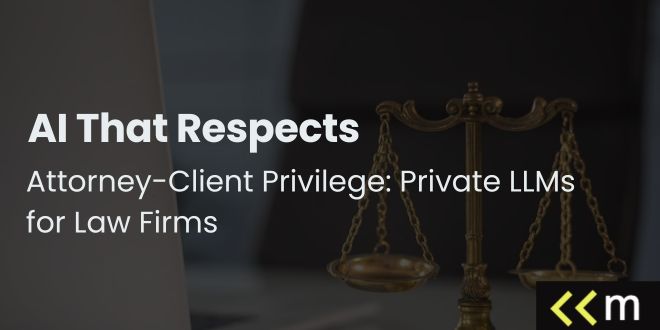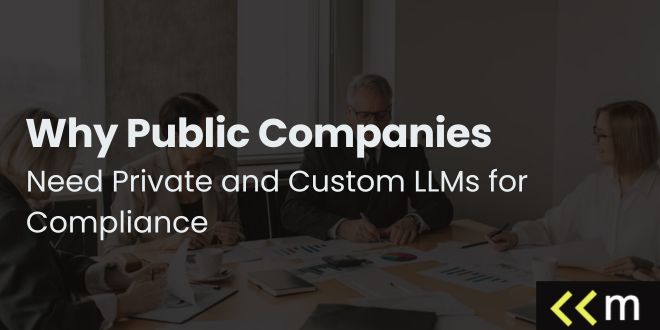AI That Respects Attorney-Client Privilege: Private LLMs for Law Firms

Every week seems to bring a fresh example of a Large Language Model transforming how professionals work. For attorneys, however, the excitement around generative AI is always tempered by a hard non-negotiable: nothing can compromise attorney-client privilege. The stakes are too high, and a single inadvertent disclosure can unravel years of carefully guarded confidentiality.
The good news is that law firms no longer have to choose between the raw power of modern AI and bulletproof privacy. By deploying private LLMs—versions of the same generative engines you read about in the headlines, but ring-fenced for legal use—firms can tap into remarkable efficiencies without sending a single privileged word beyond their own walls.
Why Privilege and Public Generative AI Often Collide
Attorney-client privilege rests on the idea that communications remain strictly between lawyer and client. When a firm uses an openly hosted chatbot, that data often leaves its secure environment and travels to a third-party server. Stored logs, hidden training pipelines, or even a poorly worded terms-of-service clause can expose sensitive details to vendors, subcontractors, and, in worst-case scenarios, opposing parties.
Key risks that arise when privileged documents interact with public AI services include:
- Data residency uncertainty: Firms can’t always verify where the provider stores or mirrors conversation logs.
- Unintended model training: Some services feed user prompts back into the model, making confidential snippets part of future outputs.
- Vague audit trails: If a breach inquiry surfaces, piecing together who saw what—and when—may prove impossible.
Those pain points explain why many CIOs hit the brakes when attorneys request access to the latest viral chatbot. Yet the legal profession still craves the time savings a well-trained LLM can deliver. The answer lies in bringing the model to the firm, rather than sending client material out to the model.
Where Standard Cloud Chatbots Fall Short
Open, consumer-grade AI tools are built for scale and broad usage, not meticulous legal compliance. In practice they often:
- Log every keystroke for system improvement, automatically opting users into data retention.
- Give ambiguous assurances such as “we do not sell your data,” while remaining silent on internal access for debugging or R&D.
- Offer limited contract customization, leaving law firms to accept boilerplate terms.
For corporate counsel and litigators who redline NDAs for sport, those uncertainties aren’t academic—they are deal-breakers.
What Makes a Private Large Language Model Different?
A private LLM is essentially the same underlying neural network that powers mass-market generative AI, but it runs inside an environment the firm controls. Think of it as renting the engine while owning the entire garage, keys, and security system. Several attributes set private deployments apart:
- In-house or dedicated cloud hosting: Data never crosses borders without explicit approval.
- Zero-retention policies by design: Neither prompts nor outputs are stored outside the firm’s chosen enclave.
- Fine-tuned on proprietary knowledge: The model can ingest past pleadings, research memos, and style guides—creating a personalized legal assistant that knows the firm’s voice.
- Custom audit logging: Every interaction is time-stamped and attributable, satisfying regulators and insurers.
Deployment Models That Keep Data in the Fortress
Law firms often select from three architectures, balancing convenience with control:
- On-premise servers. The gold standard for sensitive matters such as criminal defense or national-security work. Hardware sits inside the firm’s data center, protected by its existing physical and network safeguards.
- Single-tenant private cloud. Major providers now offer bare-metal or isolated clusters where only one client occupies the hardware. Firms get elasticity without co-mingling their data.
- Hybrid gateway. Less hardware-intensive: prompts pass through an encryption gateway, are processed by the vendor’s LLM, then wiped instantly. No logs survive outside the gateway and keys remain internal.
Each path demands rigorous technical due diligence, but when executed properly, privileged material travels no farther than it would in an email stored on the firm’s own Exchange server.
Practical Use-Cases Inside the Firm: From Summaries to Drafting
Once the privacy puzzle is solved, a private LLM becomes a quiet workhorse behind the scenes. Early adopter firms report efficiency gains in:
- Summarizing lengthy deposition transcripts into concise highlight reels for partners headed to court.
- Drafting first-pass motions or discovery responses, aligned to jurisdiction-specific templates.
- Extracting obligations from hundred-page commercial contracts and generating risk tables.
- Converting rough phone-call notes into polished client letters with firm-standard headings and citations.
- Rapidly locating precedent in the firm’s own knowledge repository, reducing “I know we filed something similar in 2017” hunts.
Crucially, attorneys stay in the loop. The model suggests, but humans approve—preserving professional judgment and ethical oversight.
Checklist for Choosing a Privilege-Friendly AI Partner
Even in a private deployment, not every vendor approaches confidentiality the same way. Decision-makers should vet candidates against criteria such as:
- Contractual guarantees that client data will never be used for model retraining or marketing.
- Clear data-deletion schedules and independent verification that logs truly vanish.
- SOC 2 Type II, ISO 27001, and, where relevant, regional certifications like GDPR compliance.
- Ability to segregate firm data at the hardware level, preventing cross-tenant memory leaks.
- Robust support for bring-your-own-encryption keys and role-based access controls.
- Transparent incident-response plans, with firm-side notification windows measured in hours, not days.
Future-proofing also matters. A vendor should offer upgrade paths as newer, more capable models emerge, so the firm doesn’t face a costly forklift replacement every 18 months.
Building a Culture Where AI Aids, Never Replaces, Legal Judgment
Deploying a private LLM is not just a technical project; it is a cultural one. Attorneys must feel confident that the tool enhances their craft rather than dilutes it. Training sessions should emphasize:
- The model as a junior colleague, not an oracle. Attorneys remain accountable for every line filed with the court.
- Proper prompt hygiene—never paste entire privileged emails when a summary suffices.
- The importance of citing sources, especially when the model generates case law references.
- Continuous feedback loops where lawyers flag hallucinations or stylistic missteps, feeding secure fine-tuning cycles.
Firms that pair sound technology with thoughtful change management often see adoption skyrocket. Associates appreciate fewer hours spent on rote tasks, partners gain quicker turnarounds, and clients notice tighter, more insightful work product.
Looking Ahead—AI Profitability Without Privilege Compromise
As legal workloads balloon and fee pressure intensifies, ignoring generative AI is no longer tenable. Yet the profession’s bedrock principle of confidentiality cannot be sacrificed on the altar of innovation. Private LLMs offer a pragmatic bridge: all the linguistic dexterity of cutting-edge AI, none of the open-internet exposure.
Firms that move early will not only protect privilege but also free up billable hours for higher-level strategy and client counseling. Over time, those efficiencies compound into competitive advantage. The talent war tilts toward employers who spare associates from monotonous grunt work. Clients gravitate to counsel who deliver insights faster without inflating invoices.
The technology will keep evolving, and standards for secure deployment will mature alongside it. What will remain constant is the simple test any legal tool must pass: does it preserve the sanctity of the lawyer-client relationship? With private Large Language Models, the answer can finally be yes.
Timothy Carter is a dynamic revenue executive leading growth at LLM.co as Chief Revenue Officer. With over 20 years of experience in technology, marketing and enterprise software sales, Tim brings proven expertise in scaling revenue operations, driving demand, and building high-performing customer-facing teams. At LLM.co, Tim is responsible for all go-to-market strategies, revenue operations, and client success programs. He aligns product positioning with buyer needs, establishes scalable sales processes, and leads cross-functional teams across sales, marketing, and customer experience to accelerate market traction in AI-driven large language model solutions. When he's off duty, Tim enjoys disc golf, running, and spending time with family—often in Hawaii—while fueling his creative energy with Kona coffee.







